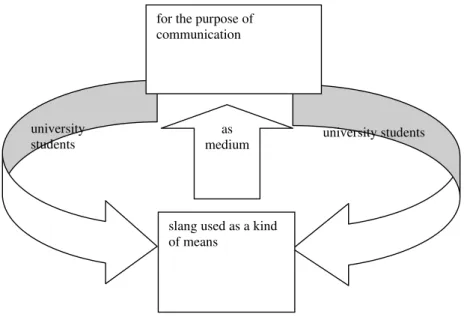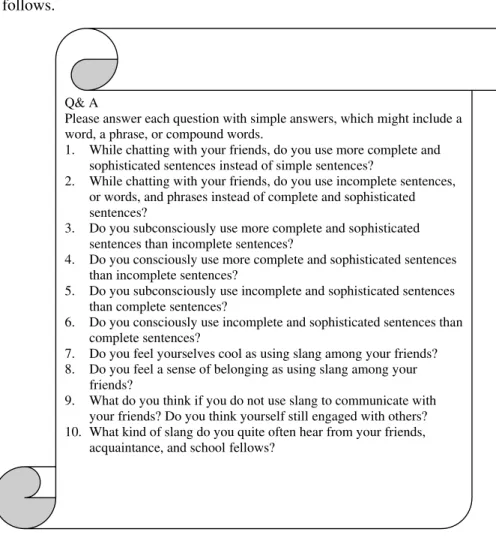UNIVERSITY STUDENTS’ SLANG AND ITS USING
CONTEXT IN TAIWAN: COMPLIMENTING AND
REBUKING DICTIONS AS EXAMPLES
PETER CHIEN-YU, KAO∗
Abstract: This paper aims to scrutinize: a) two slang categories of both complimenting and slightly rebuking people over the intended listeners’ behavior, and the intended speakers’ attitudes; b) sociocultural implications in slang used by Taiwan university students; and c) slang culture and its using contexts of two slang categories.
Keywords: slang culture and its using context, sociocultural implications, Taiwan's university students, complimenting and rebuking.
INTRODUCTION
As Peter Trudgill notes in chapter one of Sociolinguistics: An Introduction to Language and Society (2000), “...the role played by language in conveying information about the speaker” is “aspect of linguistic behavior...and reflections of the fact that there is close inter-relationship between language and society...” (2). Language spoken in one particular society differentiates from that in another. Spoken language that belongs to a particular group forms under such circumstance as the ones who share the mutually admitted registered terms based on their common knowledge. Society is a kind of circle in which a particular group of people live, behave, and interact with one another in peculiar manners. However, this research questions the order along which men create verbal repertoire first rather than they are affected by the surroundings and adopt “culturally registered terms” (Jacques Derrida).
This research paper is divided into a) definition of “slang” as introductory section, b) motivation and objectives of author's doing this sociolinguistic study, c) methodology and basic concepts (phenomenon of university slang culture in Taiwan), that is - “verbal repertoire1,” d)
∗
Peter Chien-Yu, Kao ( )
National Chung Cheng University, Chiayi County, Minxueng Township, 62102, Taiwan e-mail: applesmartflying@gmail.com
1
source of data, e) selected categories of university students' slangs, f) data analysis and g) finding of this social and cultural phenomenon, and h) conclusion which summarizes this research. Definition of “slang” prepares readers to understand its using context and speical features. Motivation and objectives segments record the author’s observation in which his interest has arisen due to listening to university students’ usage of slang as major communicative verbal repertoire. Source data and selected category include questionnaires and face-to-face interviews from which major utilized slang are classified.
Definition of “Slang”
According to Online Oxford Advanced Learner’s Dictionary, slangs signify “very informal words and expressions that are more common in spoken language, especially used by a particular group of people, for example, children, criminals, soldiers, etc” (Oxford Advanced Learner’s Dictionary). Pragmatically, “slang” denotes two functional paradigms. One is that it is more utilized in spoken langauge than written langauge because of its informal sense of expression. And its usage is situational and belongs to a particular group which is made up of by people with the smae sex, age, interest, social and ethnic background, and political tendency. People who come from Ethiopia for example share slangs that particularly originates from their race or ethnic. In other words, slang refers to a kind of spoken language that is commonly acknowledged and unconsciously employed over a wide range of topcis when utilized.
Spoken Form Written Form
75 when spoken, also signifies men’s penis which is configuration of masculine disposition and masculinity.
Table 2: Taiwan’s university students utilize slang as a means for communication, which is less formal and proves casual.
Motivation and Objectives
The author (also the TEFL instructor) once sat in the departmental students’ self-studying room during the noon break, sipping a cup of pearl milk tea. Several sophomore students suddenly flooded in. Among them was lots of slang exchanged when they communicated in Mandarin Chinese. They teased, joked about, and commented on their school fellows and intimate friends. Every five complete and incomplete sentences contained a bunch of slang, which, the author thinks, is worthy of being recorded and analyzed. They availed of the targeted registers to create a kind of situation in which they mutually know what one another meant when a particular slang is spoken whereas other people, outsiders of their social circle, might have no idea about what they meant and what the things are they refer to.
university students university
students
slang used as a kind of means
Q& A
Please answer each question with simple answers, which might include a word, a phrase, or compound words.
1. While chatting with your friends, do you use more complete and sophisticated sentences instead of simple sentences?
2. While chatting with your friends, do you use incomplete sentences, or words, and phrases instead of complete and sophisticated sentences?
3. Do you subconsciously use more complete and sophisticated sentences than incomplete sentences?
4. Do you consciously use more complete and sophisticated sentences than incomplete sentences?
5. Do you subconsciously use incomplete and sophisticated sentences than complete sentences?
6. Do you consciously use incomplete and sophisticated sentences than complete sentences?
7. Do you feel yourselves cool as using slang among your friends? 8. Do you feel a sense of belonging as using slang among your
friends?
9. What do you think if you do not use slang to communicate with your friends? Do you think yourself still engaged with others? 10. What kind of slang do you quite often hear from your friends,
acquaintance, and school fellows? METHODOLOGY AND BASIC CONCEPTS Source of the Data
The author designed questionnaire and carried out face-to-face interviews by which data come from. The questions on the questionnaire are as follows.
Table 3: It is author’s designed questionnaire that was given to forty university students who are sophomore students.
CATEGORIES
77 of the intended listener(recipient) doing something very awkward. In the other case, the author scrutinizes one’s verbal expression and its impact when the intended listener (recipient) did something that marvels and surprises the intended speaker beyond the intended speakers’ imagination, which turns out positive and negative aspects.
Mandarin Chinese and Taiwanese that Refer Targeted Listeners to/ as Idiots
University Students’ Slangs in Taiwan Mandarin Chinese (or Taiwanese)
79 Verbal Effect. Exaggeration:
81 cognitively imitate with one another in terms of behavior, and mocking attitude externally. And slang and its usage are also internally generated from university students’ thinking pattern and their minds and thoughts.
Moreover, Taiwan university students are very creative and innovative when use slang as a way of verbal articulation for interpersonal communication. They unconsciously bridge the gap among Taiwan’s regional citizens from distinct urban and rural areas.
Like the two circles put together and a hidden zone that overlaps and lies behind the scene, slang forms a sense of belonging by which Taiwan university students embody and perform through external action, reaction, and interaction with feedbacks returned from the recipient.
Table 8: The fact shows that any university using slang is truly affected by both internal perceptions and external stimuli towards a particular slang used.
have transformed from the original meaning to the new. Taiwan university students when utilizing slang simultaneously convey their personal disposition, form of verbal articulation, and individual viewpoints towards the issue that they consciously think of or unconsciously feel about something during their social interaction with their company.
REFERENCES:
Fishman, J. (ed.) (2001). Readings in the Sociology of Language. London: Mouton. Fishman, J. (2003). Language in Sociocultural Change. New York: Stanford University Press.
Fromkin, Victoria, Robert Rodman, Nina Hyams. (eds). (2003). An Introduction to Language. Boston: Wadsworth.
Giles, H., R. St Clair. (eds.) (2000). Language and Social Psychology. New York: Blackwell.
Gumperz, J., D. Hymes. (eds). (1986). Directions in Sociolinguistics. London: Blackwell.
Leitch, B. Vincent, William E. Cain, Laurie Finke, Babara Johnson. (eds.) (2001). The Norton Anthology of Theory and Criticism. New York: Norton.

